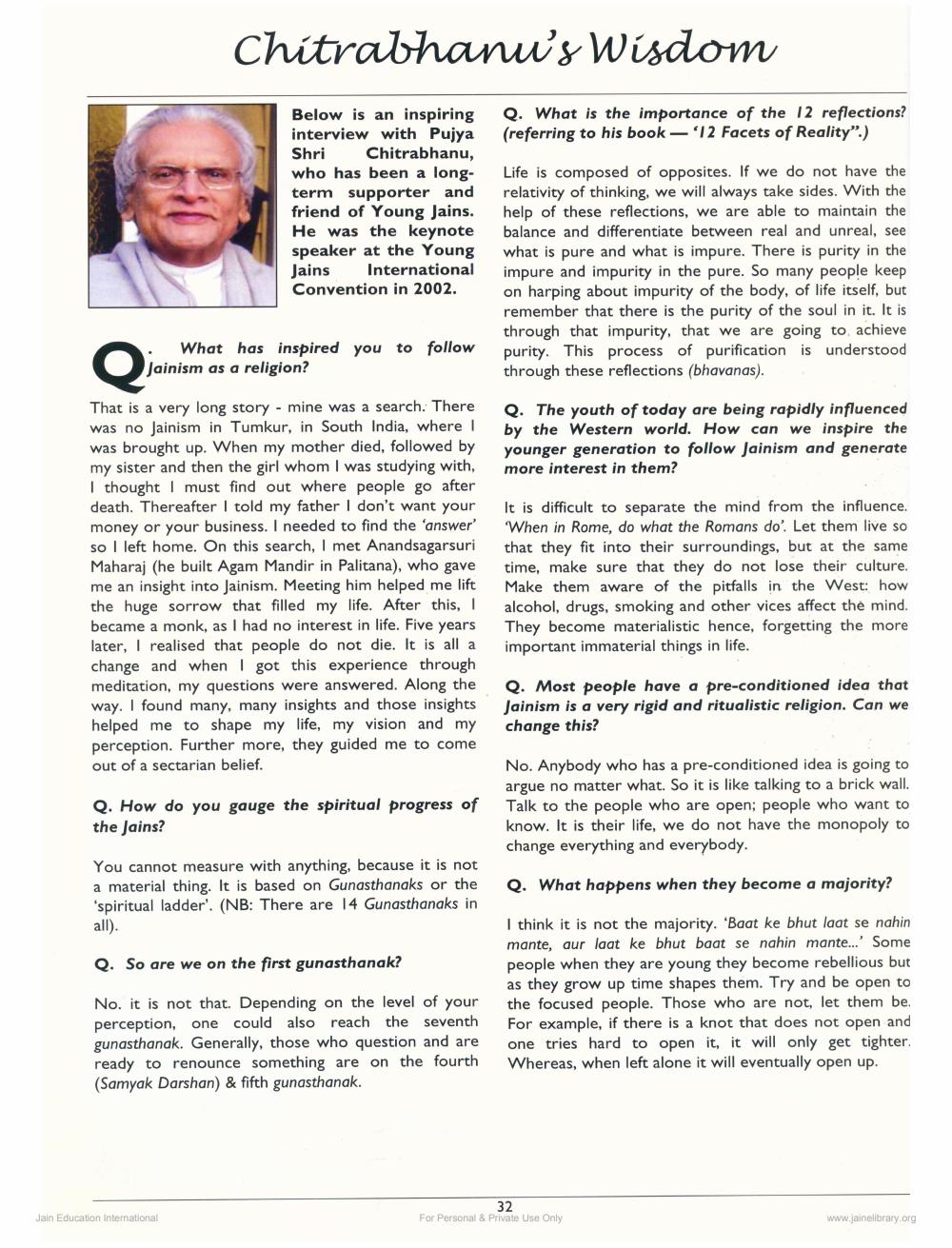________________
Chitrabhanu's Wisdom
Q. What is the importance of the 12 reflections? Q. What is the importance of the (referring to his book — '12 Facets of Reality".)
Below is an inspiring interview with Pujya Shri Chitrabhanu, who has been a longterm supporter and friend of Young Jains. He was the keynote speaker at the Young Jains International Convention in 2002.
Life is composed of opposites. If we do not have the relativity of thinking, we will always take sides. With the help of these reflections, we are able to maintain the balance and differentiate between real and unreal, see what is pure and what is impure. There is purity in the impure and impurity in the pure. So many people keep on harping about impurity of the body, of life itself, but remember that there is the purity of the soul in it. It is through that impurity, that we are going to achieve purity. This process of purification is understood through these reflections (bhavanas).
What has inspired you to follow Jainism as a religion?
Q. The youth of today are being rapidly influenced by the Western world. How can we inspire the younger generation to follow Jainism and generate more interest in them?
That is a very long story - mine was a search. There was no Jainism in Tumkur, in South India, where was brought up. When my mother died, followed by my sister and then the girl whom I was studying with I thought I must find out where people go after death. Thereafter I told my father I don't want your money or your business. I needed to find the answer so I left home. On this search, I met Anandsagarsuri Maharaj (he built Agam Mandir in Palitana), who gave me an insight into Jainism. Meeting him helped me lift the huge sorrow that filled my life. After this, became a monk, as I had no interest in life. Five years later, I realised that people do not die. It is all a change and when I got this experience through meditation, my questions were answered. Along the way. I found many, many insights and those insights helped me to shape my life, my vision and my perception. Further more, they guided me to come out of a sectarian belief.
it is difficult to separate the mind from the influence When in Rome, do what the Romans do? Let them live so that they fit into their surroundings, but at the same time, make sure that they do not lose their culture. Make them aware of the pitfalls in the West: how alcohol, drugs, smoking and other vices affect the mind. They become materialistic hence, forgetting the more important immaterial things in life.
Q. Most people have a pre-conditioned idea that Jainism is a very rigid and ritualistic religion. Can we change this?
Q. How do you gauge the spiritual progress of the Jains?
No. Anybody who has a pre-conditioned idea is going to argue no matter what. So it is like talking to a brick wall. Talk to the people who are open; people who want to know. It is their life, we do not have the monopoly to change everything and everybody.
Q. What happens when they become a majority?
You cannot measure with anything, because it is not a material thing. It is based on Gunasthanaks or the spiritual ladder'. (NB: There are 14 Gunasthanaks in all).
Q. So are we on the first gunasthanak?
No, it is not that. Depending on the level of your perception, one could also reach the seventh gunasthanak. Generally, those who question and are ready to renounce something are on the fourth (Samyak Darshan) & fifth gunasthanak.
I think it is not the majority. 'Baat ke bhut laat se nahin mante, aur laat ke bhut baat se nahin mante...' Some people when they are young they become rebellious but as they grow up time shapes them. Try and be open to the focused people. Those who are not, let them be, For example, if there is a knot that does not open and one tries hard to open it, it will only get tighter. Whereas, when left alone it will eventually open up.
32 For Personal & Private Use Only
Jain Education International
www.ainelibrary.org




